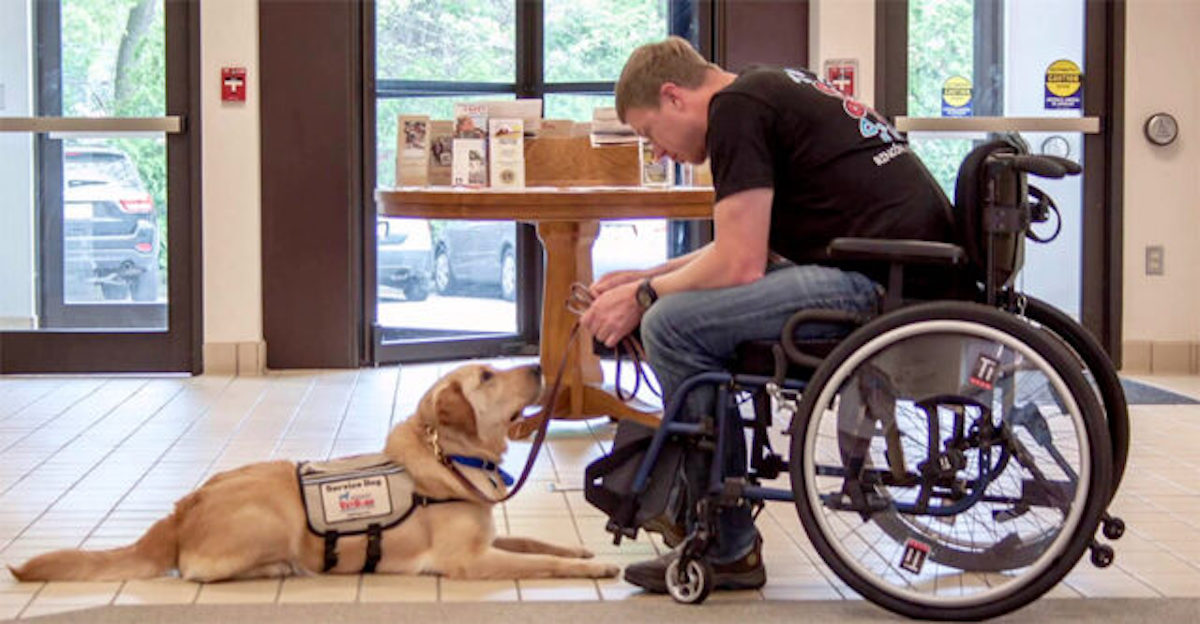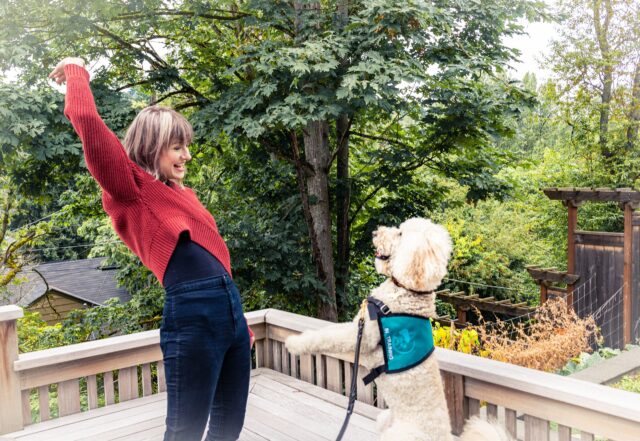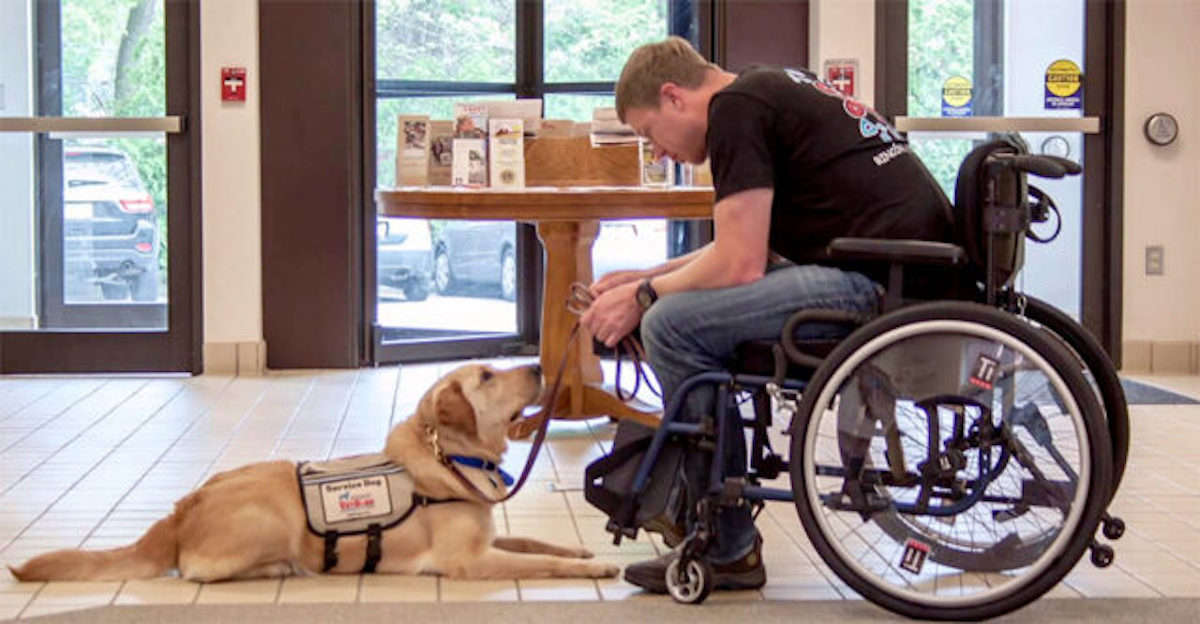Truly living up to being “man’s best friend”, there are numerous benefits of service dogs that help improve the quality of life of people with specific needs. They are specially trained to fulfill different tasks for their assigned owners and provide assistance to help them get through their daily lives.
Read on below for more information on how service dogs contribute significantly to their owners’ well-being – and devoting their lives to it.
PHYSICAL BENEFITS OF SERVICE DOGS
Different persons with disabilities require specific things from service animals. Service dogs are trained for social situations, behavior requirements, and specialized disability care. Most licensed service dogs complete two full years of training before being matched to an individual with a disability.
Service dogs support people’s physical disabilities in many ways. Often their alerts are preventative for conditions like epilepsy and dysautonomia. But many of their tasks are simple household actions. For people who are blind or deaf, their service dogs function as their eyes and ears as they navigate their surroundings.
Assistance dogs are extremely essential in ensuring that the outside world will be a safe space for their partners to be in. Guide dogs are trained to perform day-to-day tasks such as opening doors, pressing elevator buttons, fetching bags with medication, providing security when they’re outdoors, and calling for help in case their owner gets involved in an emergency.


Mobility Service Dogs
Wheelchair-bound people can also be assisted by service dogs. Mobility service dogs assist their partners by picking up objects from the floor, switching on lights, and even helping them transfer from their wheelchair to the toilet or bed. These dogs provide increased mobility to their assigned humans, helping them to be more at ease with the environment they’re in.
Service dogs aren’t only for individuals with physical disabilities – seizure alert dogs can also be of great help to people with conditions such as epilepsy. Since patients with this illness are susceptible to unexpected seizures, guide dogs are essential in preventing injuries and calling for help should their owner suffer from one.
They can also detect a seizure in advance so the patient can prepare and move to a safer location before it happens; they will touch their partner using their paw or put their head or nose on their partner’s lap as a signal.
Overall, service dogs allow a greater level of safety for persons with disabilities. Whether a chronic illness or a mobility impairment is hindering their routine and fundamental practices, expertly trained service dogs can become a partner in many activities. Service dogs as team members can work with individuals to transport items, help them move from place to place, and keep them healthy.
BENEFITS OF EMOTIONAL SUPPORT DOGS
Physical benefits are the most obvious and immediate ways for a service dog to assist a person with disabilities, but emotional benefits are also common for people who bring a service dog into their life. In general, pets boost their owner’s level of social confidence and enable them to develop supportive relationships with others.
Having a service dog means adding a loyal companion that goes beyond typical pet-human dynamics. A service dog can help in many situations, and most of them can keep a person accountable if they neglect proper management of their chronic illness or disability. This sense of security and consistent care will take some of the burdens of a person’s illness or disability.


Emotional Support Dogs
Post-traumatic Stress Disorder or PTSD is fairly common among veterans returning home from war. Emotionally, service dogs may be calming for them, as they give comfort when their owners are on the verge of having panic attacks.
They also help alleviate social anxiety, assist their owners in returning to their regular jobs, lowers their dependence on prescription drugs, and fosters a more meaningful relationship with their loved ones.
Additionally, the presence of guide dogs can boost their partner’s confidence and self-esteem. Although passers-by technically can’t engage with service dogs while on duty, this allows its owner to positively interact with others, albeit briefly.
A service dog can empower a person to become more socially active because having a pet companion will make them feel more comfortable in situations that might previously have been expected to be tiring or be unable to participate in.
Even relationships with relatives can be improved by having a service dog around. Caretakers would feel less worried because they know their patients would not be alone when they are out to do errands.
Homelife can also be less stressful with the aid of a service dog. Relationships can flourish when the service dog bears some of the responsibility in caring for a person and can alleviate some of the demanding tasks of the main caretaker.
PWDs can also rely less on other humans for help. Instead, they can transfer their needs to a service dog, who is constantly available to assist.
The toll of relying on other people can wear on some individuals after a while, and despite eager help from family members and friends who will step in, PWDs may feel restricted and dependent on others. A service dog reduces or eliminates that feeling and brings back a sense of freedom.


Service dogs need taking care, too!
Service dogs can help PWDs regain motivation to handle the potential challenge of daily chores and bring some joy to day-to-day activities. The pain and challenges experienced every day can weigh on many people with disabilities and can affect their health. A service dog still requires care from their owners, so that dog-human dependence and connection creates a reason to keep going.
Furthermore, people dealing with depression and anxiety tend to go into social isolation and experience random bouts of loneliness. Service dogs can bring comfort and healing to their owners who are in a dark place in their heads; they help keep their human partners’ minds away from stressful situations.
The best emotional support dogs and service dogs are often seen as the ones who can encourage their partners to be sociable and inspired to be back to their usual selves again. These offer companionship like no other and can make their owners’ days a little bit brighter.
There are certainly numerous benefits of service dogs to us humans. But while our canine partners protect us and make sure that our lifestyle needs are met, we must remember that they need to be taken care of, too. It is only through looking after their welfare as well that we can make our partnership with them more meaningful and worthwhile.
Please ‘SHARE’ to pass on this story to a friend or family member



